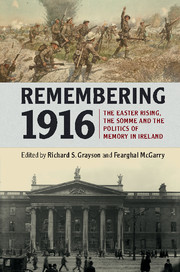Book contents
- Frontmatter
- Contents
- List of figures
- List of tables
- List of contributors
- Introduction
- Part I Memory and commemoration
- Part II Narratives
- 4 Instant history: 1912, 1916, 1918
- 5 Hard service: remembering the Abbey Theatre's rebels
- 6 Beyond the Ulster Division: West Belfast members of the Ulster Volunteer Force and Service in the First World War
- 7 Remembering 1916 in America: the Easter Rising's many faces, 1919–1963
- Part III Literary and material cultures
- Part IV Troubled memories
- Index
4 - Instant history: 1912, 1916, 1918
from Part II - Narratives
Published online by Cambridge University Press: 05 March 2016
- Frontmatter
- Contents
- List of figures
- List of tables
- List of contributors
- Introduction
- Part I Memory and commemoration
- Part II Narratives
- 4 Instant history: 1912, 1916, 1918
- 5 Hard service: remembering the Abbey Theatre's rebels
- 6 Beyond the Ulster Division: West Belfast members of the Ulster Volunteer Force and Service in the First World War
- 7 Remembering 1916 in America: the Easter Rising's many faces, 1919–1963
- Part III Literary and material cultures
- Part IV Troubled memories
- Index
Summary
I
What historian of revolutionary Ireland can claim to have remained utterly impervious to seduction during the current orgy of centennial commemoration? The study of how distant events have been remembered is suddenly both popular and profitable, offering almost irresistible attractions. The core documentation for public commemorative practices is typically compact and easily accessible: downloadable press reports of anniversary or jubilee events, perhaps a few boxes of official files. The focus of interest in commemorative studies has long since shifted from the original episodes and participants to politicised constructions of the past and the political functions of current ceremonies. Though of some intrinsic interest as well as ‘relevance’ in the eyes of funders, this genre tends to produce soft, easily digestible history. The hard questions of history (what actually happened and who thought what, why, and with what consequences) are neatly avoided. Released from tiresome delving into the distant past, historians easily mutate into columnists and pundits, accorded spurious authority because of their past credentials as scholars. Most of us will probably emerge only slightly scathed, to document another day when public interest wanes and the orgy fizzles out. However, the most prudent strategy for scrupulous historians is to avoid binge-commemorating and limit self-indulgence to the occasional review, hedge-school, or Friday colloquium.
In this chapter, I shall chart an intermediate course between the study of events and that of their commemoration, by scrutinising ‘instant history’. By this I mean the ways in which actors and observers experienced contemporary events as if they were living out history and in history. Ulster Day (28 September 1912), Easter Week (24–29 April 1916), and Anti-Conscription Day (21 April 1918) were all ‘historic’ moments for contemporaries as well as for later generations. Each whipped up a widespread sense of excitement, even awe, social solidarity, and confidence that Irish politics and life could be transformed through mass participation in a novel and dangerous experiment. The meanings attributed by contemporaries to these episodes were not mere products of political manipulation, but shaped by personal observation and experience. To make sense of ‘instant history’, one must rehearse all those hard questions. How did both organisers and observers express and enact their sense of being history-makers? How important were embedded beliefs about past history in gathering communities into these collective performances?
- Type
- Chapter
- Information
- Remembering 1916The Easter Rising, the Somme and the Politics of Memory in Ireland, pp. 65 - 85Publisher: Cambridge University PressPrint publication year: 2016
- 3
- Cited by

